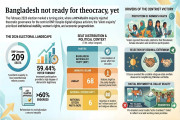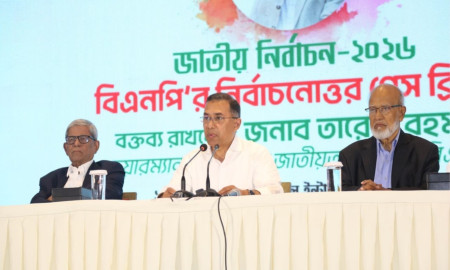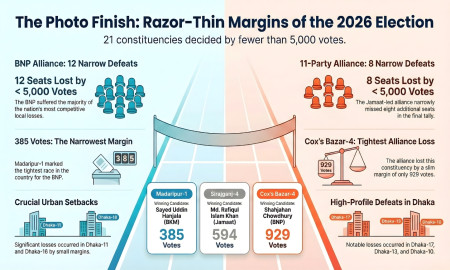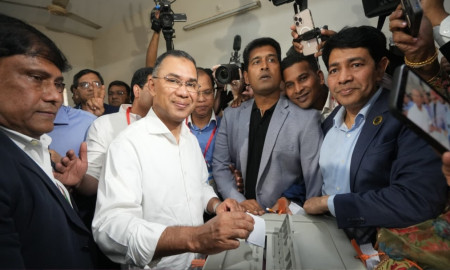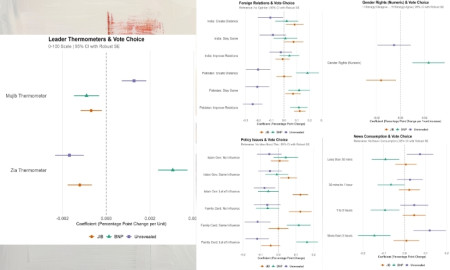TDC Explainer
How Bangladesh Built a GPA-5 Bubble, at What Cost

Every year, the announcement of the Higher Secondary Certificate (HSC) results brings a flood of smiling faces, flowers, and Facebook posts celebrating GPA-5 scorers. Parents beam with pride, schools boast of their “record success,” and politicians take credit for another “historic achievement.” On paper, it looks like Bangladesh’s education system is reaching new heights. In reality, the story beneath the numbers is far less flattering.
Data from the past fifteen years tell a clear story of how the number of GPA-5 achievers has risen, dipped, and spiked in ways that have little to do with genuine academic progress. In 2009, just over 20,000 students achieved the top grade. By 2014, that number had climbed to more than 70,000. Then came 2020, the year of the pandemic, when no public exams were held. Yet a record 1.6 lakh students received GPA-5 based on previous performances and internal assessments. The following years continued this inflation, with 1.89 lakh in 2021 and 1.76 lakh in 2022, before the figure adjusted slightly to around 78,000 in 2023. In 2024, it shot up again to nearly 1.46 lakh students.
These numbers reveal more than just academic trends. They reflect a distortion in how the nation now measures success. What once represented excellence and hard work has become an expected outcome, often achieved through policy decisions rather than educational improvement. The problem is not that more students are doing well; it is that grades no longer reflect the same value they once did.
Political motives behind inflated success
Education results in Bangladesh have long been a stage for political theatre. Under the regime of Sheikh Hasina, results have increasingly become tools to project an image of progress and stability. Each year’s “record success” conveniently serves as evidence of the government’s commitment to “modern education” and “digital Bangladesh.” But this narrative masks the widening gap between what students achieve on paper and what they can actually do in classrooms, universities, or workplaces.
The pandemic years exposed this problem most clearly. In 2020, when exams were cancelled, students were graded based on past results. There was no standardized testing, yet the number of GPA-5 achievers reached a record high. The following years continued this pattern, with limited or shortened exams in 2021, 2022, and 2023. Following the ousting of Sheikh Hasina in 2024, the so-called “auto pass” year, nearly 1.46 lakh students achieved GPA-5. If grades were a true reflection of quality, such fluctuations would not be possible. Instead, they reveal how easily the grading system can be manipulated to fit political convenience.
Teachers and education experts have repeatedly warned that inflated results undermine the credibility of the entire education system. When nearly everyone gets the top grade, it loses its meaning. Employers and university admission boards can no longer differentiate between genuine talent and inflated marks. Over time, this weakens the value of the country’s qualifications both domestically and internationally.
.jpg)
The illusion of success
The obsession with GPA-5 has created a culture where grades matter more than learning. Parents push their children into endless coaching sessions, schools design lessons around exam questions, and students memorize answers without understanding the subjects. The goal is not knowledge but numbers.
As a result, many top scorers struggle once they move beyond the classroom. University teachers often complain that students with GPA-5 struggle to write a coherent paragraph or analyze basic concepts. Employers echo the same frustration, saying that fresh graduates lack communication skills, critical thinking, and practical knowledge. When grades rise but quality falls, it signals that something fundamental has gone wrong.
How inflated results affect expectations and reality
The inflation of results has created a dangerous cycle. Parents expect their children to get GPA-5 because “everyone else is getting it.” Schools compete to produce the highest number of top scorers to attract more students. Politicians use these results as proof of national progress. In the process, genuine education takes a back seat.
When students who grew up with inflated grades face the real world, the gap between expectation and reality hits hard. Many cannot cope with the demands of university-level work or competitive job markets. The disappointment is often personal, but the impact is collective. A generation grows up equating marks with merit, only to discover that life beyond exams rewards very different skills.
The long-term consequences
This problem is not just about education statistics; it affects the country’s long-term development. When grades lose credibility, the education system loses trust. International universities and employers begin to view Bangladeshi qualifications with suspicion. At home, bright students feel demotivated when their effort is treated as equal to inflated performance. The sense of fairness disappears.
Moreover, the overproduction of top grades fuels unhealthy pressure. Students who fail to get GPA-5 often feel left behind, even if their results are respectable. This culture of comparison breeds anxiety and depression among young learners. In trying to make everyone a winner, the system ends up creating insecurity and disillusionment.
Education should inspire curiosity, creativity, and critical thinking. Instead, the current model rewards memorization and blind competition. Policymakers have turned what should be an evaluation of learning into a scoreboard for political gain. When education becomes propaganda, it stops being education at all. When excellence becomes common, mediocrity hides behind it. Bangladesh’s next education reform must restore what its report cards have lost — meaning.
What can be done
Restoring credibility to the grading system will not be easy. It requires political honesty and academic independence. Examinations must be free from manipulation and standardization must return. Shortened syllabuses and auto-passes may have been temporary solutions during a crisis, but continuing such measures for political comfort damages an entire generation’s prospects.
Teachers should be empowered to evaluate students fairly. Universities and employers must also rethink their reliance on GPA alone. Skills, creativity, and problem-solving ability should matter more than a line of digits. Parents, too, have a role. Instead of chasing perfect scores, they need to encourage real learning and resilience.
A question for the future
The rise of GPA-5s may look like success on the surface, but it hides a deeper failure. A country cannot build a strong education system on inflated numbers. True progress comes from honest evaluation, good teaching, and independent institutions.
If Bangladesh continues to treat grades as a political trophy, it risks losing the very foundation of its academic integrity. The data already tell the story: in 2009 there were 20,000 GPA-5 holders; in 2024 there are more than 1.45 lakh. Yet few believe that learning has improved sevenfold in fifteen years.
Education is meant to enlighten, not to decorate report cards. Unless the system restores trust in results, future generations will inherit certificates that look impressive but mean little. The inflation of results is not just an education issue; it is a warning that truth itself is being graded on a curve.


